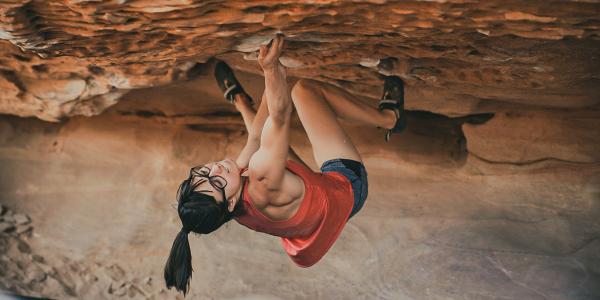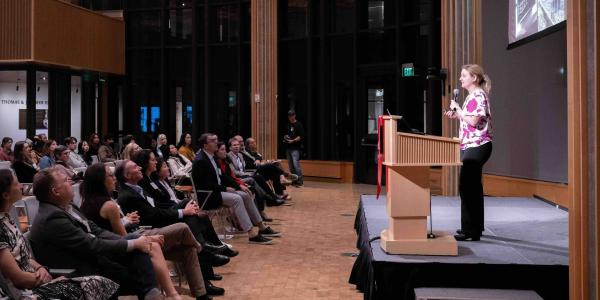A WashU philosopher explores the unexpected ways women are marginalized in sport.
Lucy Vollbrecht, a postdoctoral fellow with the Civil Society Initiative, remembers her first time rock climbing. Years ago, she couldn’t get to the top of any route and spent most of her time flailing. Still, she stuck with it. By the time she was studying for her PhD in philosophy, she became an elite-level climber, snagging podium wins and eventually becoming a sponsored professional athlete.

But as Vollbrecht rose through the ranks, she started to notice patterns of discrimination and mistreatment directed at her and other women in the sport. “I was regularly being talked down to, excluded, or written out, and my friends who are women had similar experiences,” she said. “I started thinking, ‘What’s happening here?’ I wondered how we can make sense of the collective challenges women face.”
In a recent paper published in the spring issue of Signs: Journal of Women in Culture and Society, Vollbrecht examined those challenges, exploring misogyny in sports through a philosophical lens.
Conversations about misogyny in sports have often focused on objectification, highlighting how the male gaze makes it harder for women to move freely and perform at a high level. But Vollbrecht and her fellow elite climbers didn’t experience that. In rock climbing and many other sports, women compete at a comparable level with men, unimpeded by objectification. Still, Vollbrecht said women in the sport remain subject to complex and thorny forms of discrimination.
To understand the issue, Vollbrecht turned to the work of philosopher Kate Manne. In her 2018 book, “Down Girl,” Manne suggests analyzing misogyny in terms of social and moral entitlements — or what people believe they are naturally owed. This could take the form of actual labor, but also social and emotional labor and goods, such as respect, prestige, power, and victorship, Vollbrecht explained.
“When women start to participate, it threatens the stability of the distribution of those entitlements,” Vollbrecht said. It’s the idea that men are entitled to participate in sports — and to all the benefits that come with it — while women are not. By entering male-dominated sports, women are challenging stereotypical roles and threatening men’s entitlements. “If men have always been the ones to play sports, receiving things like respect, attention, hero status, and even material goods in exchange for success, then when women enter these spaces, they are direct competitors.”


When women enter the rock climbing sphere as competitors, Vollbrecht found men sometimes respond with misogynistic attitudes and acts. This behavior can escalate from ignoring women to verbally reminding them of their lower status within the sport to, eventually, open aggression.
In her paper, Vollbrecht shared the example of a young climber she mentored, who, after outperforming her teammates, was told by a male teammate’s father that her achievement was “pretty good for a girl.”
There’s also the common practice of giving climbing routes misogynistic, racist, and ableist names, such as “Date Rape” and “Wife Beater.”
In many cases, when women point out these behaviors, men correct themselves. But Vollbrecht said that other times, the misogyny can escalate, taking the form of more extreme aggression, including harassment and assault.
Vollbrecht believes sports can serve an important role in cultivating virtue, allowing people to become confident, improve as leaders, manage failure, and strive for goals. She’s experienced these positive effects in her own life and wants others to experience the same.
In 2020, Vollbrecht and some of her fellow female climbers launched a campaign in northern Arizona to rename many of the routes with offensive, sexist names. In the future, she hopes to expand her research to examine the impact on other marginalized groups. Vollbrecht said sports often get overlooked by philosophers, but she sees significant potential for deeper philosophical exploration, given the profound cultural impact of athletics.
“Through climbing, I realized I could do hard things,” she said. “Climbing taught me to overcome self-doubt and work hard. I hope that everyone gets to find their own version of that.”
Header image: Vollbrecht climbing Habitat for Humanity, a bouldering route in Moe’s Valley, Utah. (Credit: Michael Pang)





